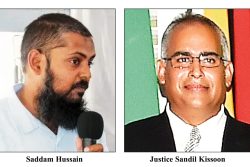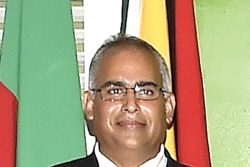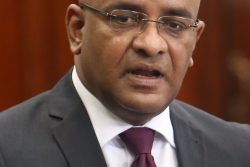Trinidad’s Prime Minister Dr Keith Rowley says Caricom is on alert and security agencies are working to combat any terrorist threat that could potentially affect the 2024 International Cricket Council (ICC) Men’s T20 World Cup.
The event is scheduled to take place from June 1-29, 2024.
The Sunday Express contacted the Prime Minister yesterday for comment.
Rowley is the chair of Trinidad and Tobago’s National Security Council and chair of the Caricom Prime Ministerial Sub-Committee on Cricket.
The Prime Minister replied: “Unfortunately, the threat of terrorism in its many and varied expressions is an ever-present danger in the world of the 21st century. It is against this backdrop that all nations, like our region, when hosting large or vulnerable gatherings, make an extra effort in national security preparations and response readiness to take seriously, all threats, expressed or implied.
“Given the fact that bad actors can choose to misbehave in any way possible it makes it virtually impossible to completely seal off all opportunities.”
The Prime Minister told the Sunday Express: “However, in order to ameliorate these dangers, we at the local and regional levels have remained alert to many threats and singularly or together have our intelligence and other security agencies working to protect the population in countries and at venues throughout the tournament.”
On May 3rd, Stabroek News reported that CARICOM’s agency for crime and security has advised regional governments of a possible Islamic State threat to the upcoming men’s T20 World Cup in June which will be played in Guyana, other parts of the Caribbean and the United States.
The CARICOM Implementation Agency for Crime and Security (IMPACS) in its communication said that the Pro-Islamic State (Daesh) media group “Nashir Pakistan” had called for attacks against the tournament via poster on its Telegram and RocketChat channels which included a Quranic passage warning “people indulging in amusement would ultimately face the day of reckoning”.
The following message in Urdu “this is not a game but rather a blood deal” was also featured.
Member States and partners were encouraged to continue sharing information and intelligence about potential threats and suspicious activities with CARICOM IMPACS in the lead up to and throughout the tournament.
It said that increased vigilance and additional security precautions are critical to mitigating the threat of terrorism and ensuring a safe and secure Caribbean region.
IMPACS advised that stringent security measures must be implemented and maintained in the lead up to and throughout the tournament’s duration to create a safe and enjoyable environment for participants and spectators alike:
1. Explosive Ordnance Disposal (EOD) Training: Member States should be equipped with the skills necessary to safely identify, handle, neutralize and dispose of explosive devices, including improvised explosive devices (IEDs), unexploded ordnance (UXO), and hazardous materials.
2. Enhanced Monitoring: Increase monitoring in cricket stadiums, hotels, tourist attractions and critical infrastructure to detect, deter and defeat any suspicious activities or individuals.
3. Show of Force/Security Presence: Member States should augment security where applicable (police, military, border security specialists, private security, and intelligence agencies). Provide a visible deterrent and quick reaction force (QRF) to security incidents and threats.
4. Intelligence and Information Sharing: Stakeholders must continue to actively share information and intelligence in a timely manner with CARICOM IMPACS and partners on nationalities of interest and persons or groups with a proclivity to commit acts of terrorism.
5. Crowd Control Measures: Host nations should monitor and control the flow of people to reduce the possibility of overcrowded areas, which provide soft targets for terrorist attacks.
6. Cargo and Baggage Checks: Stakeholders must conduct strict screening measures at ports, stadiums, hotels, tourist attractions and of critical infrastructure to inhibit the movement of weapons or Improvised Explosive Devices (IEDs). Increases the safety of stakeholders including participants and spectators.
7. Public Awareness Campaigns: Member States must launch public awareness campaigns to educate spectators and the general public about the threats posed by terrorist groups and lone wolves and the importance of urgently reporting any suspicious activities to authorities.
8. Emergency Response Planning: Host nations should develop and rehearse emergency response plans to effectively respond to security incidents, including terrorist attacks, and mitigate their impact on the safety of participants and spectators.
9. Media Monitoring: Continuously monitor the activities and communication channels of terrorist groups, to keep abreast of their tactics, techniques and procedures. Provides updated information and facilitates flexibility to adjust security measures accordingly.
Last week, the Caricom Regional Cricket Conference was held at the Hyatt Regency (Trinidad) in Port of Spain and examined the state of affairs of West Indies cricket.
The conference was attended by a number of Caribbean dignitaries and cricket stakeholders.
The World Cup will be co-hosted by the West Indies with venues in Antigua and Barbuda, Barbados, Guyana, Saint Lucia, St Vincent and the Grenadines, Trinidad and Tobago and the USA with venues in Florida, New York and Texas.







